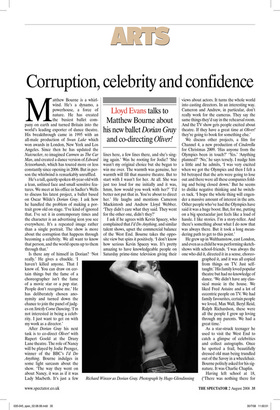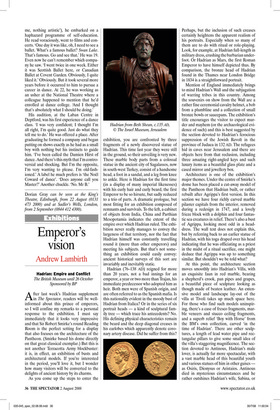Corruption, celebrity and confidence
Lloyd Evans talks to Matthew Bourne about his new ballet Dorian Gray and co-directing Oliver!
Matthew Bourne is a whirlwind. He’s a dynamo, a powerhouse, a force of nature. He has created the busiest ballet company on earth and turned Britain into the world’s leading exporter of dance theatre. His breakthrough came in 1995 with an all-male production of Swan Lake which won awards in London, New York and Los Angeles. Since then he has updated the Nutcracker, re-imagined Carmen as The Car Man, and created a dance version of Edward Scissorhands, which has toured more or less constantly since opening in 2006. But in person the whirlwind is remarkably unruffled.
He’s a tall, quietly spoken 48-year-old with a lean, unlined face and small sensitive features. We meet at his office in Sadler’s Wells to discuss his latest project, a ballet based on Oscar Wilde’s Dorian Gray. I ask how he handled the problem of making a portrait grow old on stage. ‘I’ve kind of ignored that. I’ve set it in contemporary times and the character is an advertising icon you see everywhere. It’s a repeated image rather than a single portrait. The show is more about the corruption that happens through becoming a celebrity. We all want to know that person, and the world opens up to them through that.’ Is there any of himself in Dorian? ‘Not really.’ He gives a chuckle. ‘I haven’t killed anyone. That I know of. You can draw on certain things but the fame of a choreographer isn’t the fame of a movie star or a pop star. People don’t recognise me.’ He has deliberately chosen anonymity and turned down the chance to join the panel of judges on Strictly Come Dancing. ‘I’m not interested in being a celebrity. I just want to get on with my work as a director.’ After Dorian Gray his next task is to co-direct Oliver! with Rupert Goold at the Drury Lane theatre. The role of Nancy will be played by Jodie Prenger, winner of the BBC’s I’d Do Anything. Bourne indulges in some light sarcasm about the show. ‘The way they went on about Nancy, it was as if it was Lady Macbeth. It’s just a few lines here, a few lines there, and she’s singing again.’ Was he rooting for Jodie? ‘She wasn’t my original choice but she began to win me over. The warmth was genuine, her warmth will fill that massive theatre. But to start with I wasn’t for her. At all. She was just too loud for me initially and it was, hmm, how would you work with her?’ ‘I’d better not put that in. You’re about to direct her.’ He laughs and mentions Cameron Mackintosh and Andrew Lloyd Webber. ‘They didn’t care what they said. They went for the other one, didn’t they?’ I ask if he agrees with Kevin Spacey, who complained that I’d Do Anything, and similar talent shows, upset the commercial balance of the West End. Bourne takes the opposite view but spins it positively. ‘I don’t know how serious Kevin Spacey was. It’s pretty amazing to have knowledgeable people on Saturday prime-time television giving their views about actors. It turns the whole world into casting directors. In an interesting way. Cameron and Andrew, in particular, don’t really work for the cameras. They say the same things they’d say in the rehearsal room. And the TV show gets people excited about theatre. If they have a great time at Oliver! they’re going to book for something else.’ We discuss other projects, a film for Channel 4, a new production of Cinderella for Christmas 2009. ‘Has anyone from the Olympics been in touch?’ ‘Yes.’ ‘Anything planned?’ ‘No,’ he says tersely. I nudge him a little and he admits, ‘I was very excited when we got the Olympics and then I felt a bit betrayed that the arts were going to lose out and there were all these companies folding and being closed down.’ But he seems to dislike negative thinking and he switches tack. ‘I hope the whole thing will engender a massive amount of interest in the arts. Other people who’ve had the Olympics have said it was a huge boost. But, for me, putting on a big spectacular just feels like a load of hassle. I like stories. I’m a story-teller. And there’s something about what I do now that was always there. But it took a long meandering path to get to this point.’ He grew up in Walthamstow, east London, and even as a child he was performing sketchshows with school-friends. ‘I was always the one who did it, directed it in a sense, choreographed it, and it was all copied from things on TV. Just selftaught.’ His family loved popular theatre but had no knowledge of dance. ‘We didn’t have any classical music in the house. We liked Fred Astaire and a lot of eccentric people on TV. We had family favourites, certain people we loved, Max Wall, Beryl Reid, Ralph Richardson, these were all the people I grew up loving through my parents. We had a great time.’ As a star-struck teenager he used to visit the West End to catch a glimpse of celebrities and collect autographs. Once he spotted a frail, beautifully dressed old man being trundled out of the Savoy in a wheelchair. Bourne politely asked for his signature. It was Charlie Chaplin.
Having left school at 18, (‘There was nothing there for me, nothing artistic’), he embarked on a haphazard programme of self-education. He read voraciously, went to films and concerts. ‘One day it was like, oh, I need to see a ballet. What’s a famous ballet? Swan Lake. That’s famous. Go and see that.’ He was 19. Even now he can’t remember which company he saw. ‘I went twice in one week. Either it was Scottish Ballet here, or Canadian Ballet at Covent Garden. Obviously, I quite liked it.’ Obviously. But it took several more years before it occurred to him to pursue a career in dance. At 22, he was working as an usher at the National Theatre where a colleague happened to mention that he’d enrolled at dance college. ‘And I thought that’s absolutely what I should be doing.’ His audition, at the Laban Centre in Deptford, was his first experience of a dance class. ‘I was very confident; I thought I’m all right, I’m quite good. Just do what they tell me to do.’ He was offered a place. After graduating he formed a company and began putting on shows exactly as he had as a small boy with nothing but his instincts to guide him. ‘I’ve been called the Damien Hirst of dance. And there’s this myth that I’m controversial and shocking. But I’m the opposite, I’m very wanting to please. I’m old-fashioned.’ A label he much prefers is ‘the Noël Coward of dance’. ‘Does anyone call you Master?’ Another chuckle. ‘No. Mr B.’ Dorian Gray can be seen at the King’s Theatre, Edinburgh, from 22 August (0131 473 2000) and at Sadler’s Wells, London, from 2 September (0844 412 4300).



























































 Previous page
Previous page